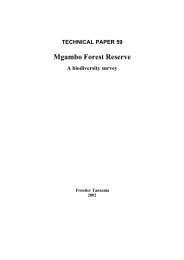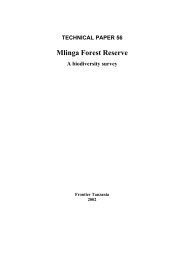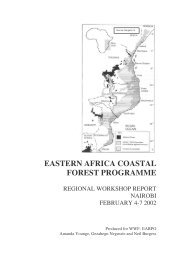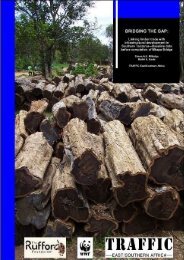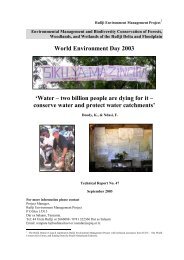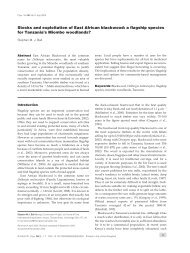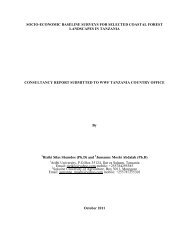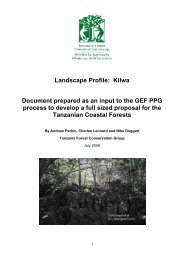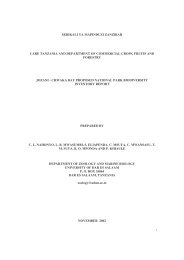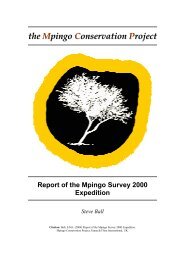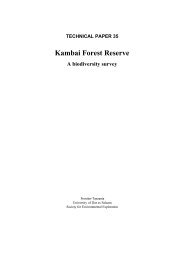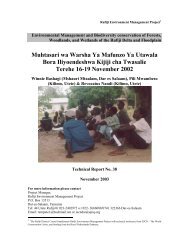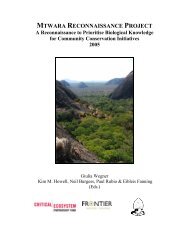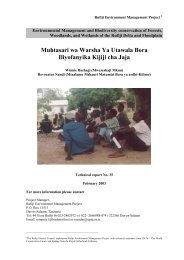A Socio-Economic Profile of the Rufiji Floodplain and Delta.
A Socio-Economic Profile of the Rufiji Floodplain and Delta.
A Socio-Economic Profile of the Rufiji Floodplain and Delta.
You also want an ePaper? Increase the reach of your titles
YUMPU automatically turns print PDFs into web optimized ePapers that Google loves.
<strong>Socio</strong>-economic pr<strong>of</strong>ile <strong>of</strong> <strong>Rufiji</strong> flood plain <strong>and</strong> <strong>Delta</strong> - Vol. 1<br />
4.1.3.5 dependence <strong>and</strong> pressure on natural resources<br />
4.1.3.6 access to resources<br />
4.1.3.7 control <strong>and</strong> ownership <strong>of</strong> resources<br />
4.1.3.8 social organisation<br />
4.1.3.9 wealth <strong>and</strong> poverty<br />
4.1.3.10 livelihood security<br />
4.1.3.11 trading <strong>and</strong> marketing characteristics<br />
4.1.3.12 migration <strong>and</strong> demographic trends<br />
4.1.3.13 attitude to <strong>the</strong> environment<br />
4.1.3.14 environmental management initiatives <strong>and</strong> activities<br />
(For all <strong>the</strong> above include gender desegregated data)<br />
4.1.4 Produce socio-economic pr<strong>of</strong>ile <strong>of</strong> <strong>the</strong> flood plain <strong>and</strong> <strong>Delta</strong> which covers <strong>the</strong> issues<br />
mentioned in 4.1.3 above <strong>and</strong> also addresses <strong>the</strong> following topics<br />
4.1.4.1 <strong>Socio</strong>-economic zonation <strong>of</strong> <strong>the</strong> <strong>Rufiji</strong> flood plain <strong>and</strong> <strong>Delta</strong>, including necessary data for<br />
input to geographical information systems (GIS) in order to produce <strong>the</strong>matic maps.<br />
4.1.4.2 Descriptions <strong>of</strong> <strong>the</strong> distinguishing characteristics <strong>of</strong> each zone defined in 4.1.4.1<br />
4.1.4.3 Comments on whe<strong>the</strong>r <strong>the</strong> consultant’s zonation corresponds with <strong>the</strong> four agro-economic<br />
zones arbitrarily chosen by REMP. If not, how it differs <strong>and</strong> why<br />
4.1.4.4 Migration inward, outward <strong>and</strong> within <strong>the</strong> flood plain <strong>and</strong> how it relates to socio-economic<br />
status<br />
4.1.4.5 Population trends in <strong>the</strong> flood plain <strong>and</strong> <strong>Delta</strong><br />
4.2 Identify four additional villages for project intervention.<br />
Apply REMP criteria, as in Appendix 1, attached<br />
4.3 Design a monitoring system for <strong>the</strong> project impact on target population’s livelihoods<br />
4.3.1 Identify indicators <strong>of</strong> project impact that are within <strong>the</strong> capacity <strong>of</strong> <strong>the</strong> district council to<br />
monitor<br />
4.3.2 Develop <strong>and</strong> describe in detail a proposed system for monitoring which includes a schedule <strong>of</strong><br />
action (what, who, when), means <strong>and</strong> costs <strong>and</strong> will have <strong>the</strong> following characteristics; simple, within<br />
<strong>the</strong> responsibility <strong>of</strong> <strong>the</strong> district council, involves local communities, includes a feedback mechanism<br />
into future planning at all levels.<br />
5 Outputs<br />
5.1 A socio-economic pr<strong>of</strong>ile <strong>of</strong> <strong>Rufiji</strong> flood plain <strong>and</strong> <strong>Delta</strong> (including a gender pr<strong>of</strong>ile), as<br />
described in 4.1<br />
5.2 The names <strong>of</strong> <strong>the</strong> four villages identified for project intervention, as described in 4.2 above.<br />
5.3 A description <strong>of</strong> a system for monitoring <strong>the</strong> impact <strong>of</strong> <strong>the</strong> project on target communities’<br />
livelihoods (as in 4.3 above)<br />
6 Expertise required<br />
The consultant will have an education background in socio-economics, sociology, economics, natural<br />
resource economics, rural economics or agro-economics with at least 5 years experience <strong>of</strong> designing<br />
<strong>and</strong> implementing field studies regarding socio-economic issues. The consultant will have experience<br />
<strong>of</strong> factors affecting <strong>the</strong> livelihood security <strong>of</strong> <strong>the</strong> communities, particularly migrant communities.<br />
The consultant will also have at least five years experience <strong>of</strong> project monitoring <strong>and</strong> evaluation<br />
systems will be required. Expertise in computer database programmes preferably MS access is also<br />
necessary. Swahili language skills will be an advantage.<br />
7 Reporting<br />
Three reports will be prepared corresponding with <strong>the</strong> three outputs mentioned in 5.0 above. Drafts <strong>of</strong><br />
all three reports will be prepared in English <strong>and</strong> submitted in MS word floppy disk <strong>and</strong> hard copy, as<br />
per <strong>the</strong> reporting schedule below. The final report, including a Swahili summary will be submitted on<br />
or before September 15 th 2000. Data should be presented on floppy disk using MS access <strong>and</strong> MS<br />
excel programmes.<br />
70



